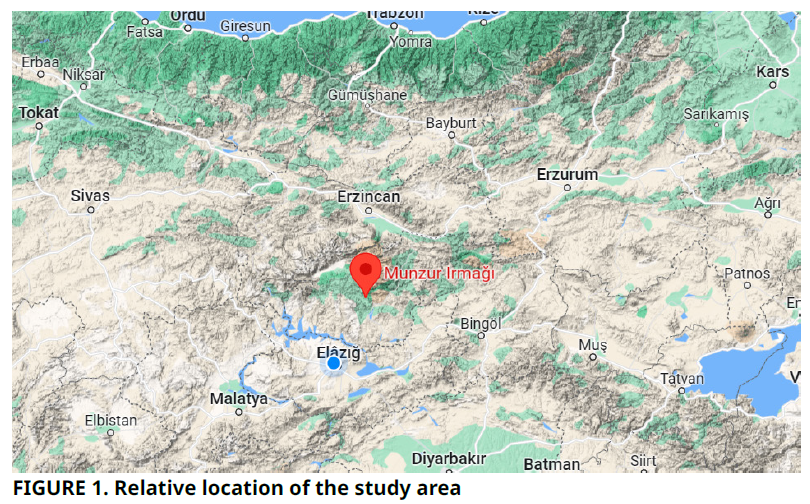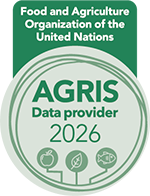Comparación entre modelos tradicionales y redes neuronales artificiales como estimadores del crecimiento del raspador del Tigris Capoeta umbla (Teleostei: Cyprinidae) en el río Munzur, Turquía
Resumen
En este estudio, se realizó una comparación de los métodos de crecimiento tradicionales (relaciones longitud-peso y función de crecimiento de von Bertalanffy) con las redes neuronales artificiales en el crecimiento de 783 ejemplares de Capoeta umbla del río Munzur, Turquía de septiembre de 2019 a mayo de 2021. Se determinó la relación longitud–peso W = 0.0085L3.013 R2=0,943 para todos los individuos. Las edades de los ejemplares fueron de 0 a 11 años. La función de crecimiento de von Bertalanffy fue Lt = 46,15 [1-e-0,139 (t + 2,57)] y Wt = 856,32 [1-e-0,39 (t + 2,57)]3,013 para todos los individuos. El valor de Ф' fue 2,471 para todos los individuos. El entrenamiento se detuvo y el mejor rendimiento de validación se fijó en 8,1473 × 10-5 en la época 42. Las comprobaciones de validación fueron alcanzado como 6, en la época 48 y el gradiente = 5,6566 × 10-5 en la época 48. El valor R de salida objetivo fue de 0.98584 para el entrenamiento, de 0,98969 para la validación, de 0,98757 para las pruebas y de 0,9868 para todos. Los valores MAPE calculados fueron de 0,140 y 0,578 para redes neuronales artificiales, 1,168 y 2,726 para relaciones longitud–peso, y 5,721 y 4,013 para función de crecimiento de von Bertalanffy, respectivamente. Los valores SSE calculados para longitud y peso fueron 0,0128 y 30,864 para redes neuronales artificiales, y 1,3985 y 350,786 para relaciones longitud–peso. Los resultados del estudio actual muestran que las redes neuronales artificiales pueden ser estimadores superiores a relaciones longitud–peso y función de crecimiento de von Bertalanffy. Por tanto, los modelos de redes neuronales artificiales son una herramienta eficaz para describir el peso y la longitud corporal de los peces.
Descargas
Citas
Çelikkale M. Türkiye Balıkçılığında Sektörel Yapı ve Politikalar, Eğitiminin 10. Yılında Su Ürünleri Sempozyumu [Sectoral structure and policies in Turkish fisheries. Aquaculture symposium: On the 10th anniversary of its education]; 12-14 Nov. 1991; İzmir; Ege University, Faculty of Fisheries. p. 13-21. Turkish.
Erkoyuncu İ. Balıkçılık biyolojisi ve populasyon dinamiği [Fisheries biology and population dynamics]. Samsun (Türkiye): Ondokuz Mayis University Publications; 1995. 265 p. Turkish.
Özdemir F. Türkiye’deki Capoeta (Teleostei: Cyprinidae) Cinsine Ait Tür ve Alttürlerin Klasik ve Moleküler Sistematik Yöntemler Kullanılarak Revizyonu [The revision of species and subspecies of the genus Capoeta (Teleostei: Cyprinidae) by using both the classical systematic and molecular systematic methods in Turkey]. [dissertation on the Internet]. Ankara (Türkiye): Hacettepe University; 2013 [cited 8 Apr. 2024]. 171 p. Turkish. Available in: https://goo.su/oG86d
Şen D, Aydın R. Growth properties of Capoeta capoeta umbla (Heckel, 1843) living in Hazar Lake, Elazığ. Fırat Üniversitesi Fen ve Mühendislik Bilimleri Dergisi. 2000; 12(2):261-271.
Türkmen M, Erdoğan O, Yıldırım A. Akyurt İ. Reproduction tactics, age and growth of Capoeta capoeta umbla Heckel, 1843 from the Aşkale Region of the Karasu River, Turkey. Fish. Res. [Internet]. 2002; 54(3):317-328. doi: https://doi.org/fvzwh7 DOI: https://doi.org/10.1016/S0165-7836(01)00266-1
Güneş M. Tercan baraj gölü ve Tuzla çayında yaşayan Capoeta capoea umbla Heckel, 1843 populasyonlarının bazı biyo-ekolojik özellikleri, total yağ ve yağ asidi kompozisyonlarının karşılaştırılması [Determination of some bio-ecological properties and total fat an fatty acid compositions of Capoeta capoeta umbla (Heckel, 1843) populations living in Tercan dam and Tuzla river] [dissertation on the Internet]. Erzurum (Türkiye): University of Ataturk; 2007 [cited 27 Apr. 2024]. 130 p. Turkish. Available in: https://goo.su/U2SfL
Çoban MZ, Gündüz F, Demirol F, Örnekçi, G.N, Karakaya G, Türkgülü İ, Alp A. Population dynamics and stock assessment of Capoeta umbla (Heckel, 1843) in Lake Hazar, Elazığ, Turkey. Turk. J. Fish. Aquat. Sci. [Internet]. 2013 [cited 8 Apr. 2024]; 13:221-231. Available in: https://goo.su/U0BC0 DOI: https://doi.org/10.24102/ijafr.v2i2.191
Gündüz F, Çoban MZ, Yüksel F, Demirol F, Kurtoğlu M, Yıldız N. Uzunçayır Baraj Gölü’ndeki (Tunceli) Capoeta trutta (Heckel, 1843)’nın Bazı Populasyon Parametreleri [Some population parameters of Capoeta umbla (Heckel, 1843) in Uzunçayır Dam Lake (Tunceli). Yunus Araştirma Bülteni [Internet]. 2014 [cited 24 Jul. 2024]; (2):3-14. Turkish. Available in: https://goo.su/pSUl5 DOI: https://doi.org/10.17693/yunus.09057
Serdar O, Özcan Eİ. Length-weight and length-length relationships of Capoeta umbla in Karasu River (East Anatolia, Turkey). Ege J. Fish. Aquat. Sci. [Internet]. 2016; 33(4):413-416. doi: https://doi.org/g83k9h DOI: https://doi.org/10.12714/egejfas.2016.33.4.16
Eroğlu M, Düşükcan M, Çoban MZ. Özlüce Baraj Gölü’nde Yaşayan Capoeta umbla (Heckel, 1843)’nın Bazı Populasyon Parametreleri [Some population parameters of Capoeta umbla (Heckel, 1843) living in Özlüce Dam Lake, Turkey]. KSÜ Tarim ve Doğa Derg [Internet]. 2018; 21(2):229-238. Turkish. doi: https://doi.org/g83k9j DOI: https://doi.org/10.18016/ksudobil.309596
Ozcan EI, Serdar O. Evaluation of a new computer method (ANNs) and traditional methods (LWRs and VBGF) in the calculation of some growth parameters of two cyprinid species. Fresenius Environ. Bull. [Internet]. 2019 [cited 10 May 2024]; 28(10):7644-7654. Available in: https://goo.su/1rw7I3t
Ozcan EI, Serdar O. Some growth parameters of Capoeta umbla (Heckel, 1843) population living in the Pülümür River. Int. J. Pure Appl. Sci. [Internet]. 2021; 7(3):410-418. doi: https://doi.org/g639f5 DOI: https://doi.org/10.29132/ijpas.909206
Öztemel E. Artificial neural networks. In: Ören T, Çölkesen R, Üner T, editors. Tirkiye Bilişim Ansiklopedisi [Türkiye Informatics Encyclopedia]. 3rd ed. Ankara (Türkiye): Papatya Bilim Yayınevi; 2012. p. 926-931. Turkish.
Sharda R, Patil RB. Connectionist approach to time series prediction: an empirical test. J. Intell. Manuf. [Internet]. 1992; 3(5):317-323. doi: https://doi.org/bj7xpg DOI: https://doi.org/10.1007/BF01577272
Kaastra I, Boyd M. Designing a neural network for forecasting financial and economic time series. Neurocomputing [Internet]. 1996; 10(3):215-236. doi: https://doi.org/cnrs6d DOI: https://doi.org/10.1016/0925-2312(95)00039-9
Türeli Bilen C, Kokcu P, Ibrikci T. Application of artificial neural networks (ANNs) for weight predictions of blue crabs (Callinectes sapidus RATHBUN, 1896) using predictor variables. Medit. Marine Sci. [Internet]. 2011; 12(2):439-446. doi: https://doi.org/gp84sf DOI: https://doi.org/10.12681/mms.43
Benzer S, Benzer R. New perspectives for predicting growth properties of crayfish (Astacus leptodactylus Eschscholtz, 1823) in Uluabat Lake. Pakistan J. Zool. [Internet]. 2018; 50(1):35-45. doi: https://doi.org/g83k9k DOI: https://doi.org/10.17582/journal.pjz/2018.50.1.35.45
Ozcan EI, Serdar O. Artificial neural networks as new alternative method to estimating some population parameters of tigris loach (Oxynoemacheilus tigris (Heckel, 1843)) in the Karasu River, Turkey. Fresenius Environ. Bull. [Internet]. 2018 [cited 10 May 2024]; 27(12B):9840-9850. Available in: https://goo.su/M7Kipl
Ozcan EI. Artificial neural networks (a new statistical approach) method in length-weight relationships of Alburnus mossulensis in Murat River (Palu-Elazığ) Turkey. Applied Eco. Environ. Res. [Internet]. 2019; 17(5):10253-10266. doi: https://doi.org/gv7fsv DOI: https://doi.org/10.15666/aeer/1705_1025310266
Benzer S, Benzer R. Growth properties of Pseudorasbora parva in Süreyyabey reservoir: traditional and artificial intelligent methods. Thalassas [Internet]. 2020; 36:149-156. doi: https://doi.org/g83k9m DOI: https://doi.org/10.1007/s41208-020-00192-1
Sangün L, Güney Oİ, Özalp P, Başusta, N. Estimation of body weight of Sparus aurata with artificial neural network (MLP) and M5P (nonlinear regression)-LR algorithms. Iran J. Fish. Sci. [Internet]. 2020; 19(2):541-550. doi: https://doi.org/g83k9n
Benzer S, Benzer R. Growth parameters with traditional and artificial neural networks methods of big-scale sand smelt (Atherina boyeri Risso, 1810). Ege Fish. Aquat. Sci. [Internet]. 2023; 40(2):96-102. doi: https://doi.org/g83k9p DOI: https://doi.org/10.12714/egejfas.40.2.02
Bulut H. Estimation of zooplankton density with artificial neural networks (a new statistical approach) method, Elazığ-Türkiye. Oceanol. Hydrobiol. Stud. [Internet]. 2023; 52(4):502-515. doi: https://doi.org/g83k9q DOI: https://doi.org/10.26881/oahs-2023.4.11
Ozcan EI. Performance of artificial neural networks and traditional methods in determining selected growth parameters of Alburnus sellal Heckel, 1843. Oceanol. Hydrobiol. Stud. [Internet]. 2024; 53(2):153-163. doi: https://doi.org/g83k9r DOI: https://doi.org/10.26881/oahs-2024.2.06
Maravelias CD, Haralabous J, Papaconstantinou C. Predicting demersal fish species distributions in the Mediterranean Sea using artificial neural networks. Mar. Ecol. Prog. Ser. [Internet]. 2003; 255:249-258. doi: https://doi.org/b536w3 DOI: https://doi.org/10.3354/meps255249
Saler S, Haykır H, Baysal N. Zooplankton of Uzunçayir Dam Lake (Tunceli-Turkey). J. Fish. Sci. [Internet]. 2014; 8(1):1-7. doi: https://doi.org/g83k9s
Bulut H, Sesli A, Tepe R. Uzunçayır baraj gölü güncel zooplanktonunun bazı su kalite parametreleri ile değerlendirilmesi [The assesment of current Zooplankton in Uzunçayır Dam Lake with some water quality parameters]. Int. J. Pure Appl. Sci. [Internet]. 2021; 7(3):429-441. Turkish. doi: https://doi.org/g83k9t DOI: https://doi.org/10.29132/ijpas.938647
Google Maps. Munzur Irmağı (Türkiye). [Internet]. 2024 [cited 12 Jul. 2024]. Available in: https://goo.su/lGZzm
Lagler KF, Bardach JE, Miller RR, Passino DRM. Ichthyology. 2nd ed. New York (NY, USA): John Wiley and Sons; 1991. 528 p.
Zar JH. Biostatistical analysis. 2nd ed. Englewood Cliffs (NJ, USA): Prentice-Hall; 1984. 718 p.
Sparre P, Venema SC. Introduction to tropical fish stock assessment, Part I: Manual. Rome (Italy): FAO Fisheries Technical Paper; 1998. 306 p.
Beamish RJ, Fournier DA. A method for comparing the precision of a set of age determinations. Canadian J. Fish. Aquat. Sci. [Internet]. 1981; 38(8):982-983. doi: https://doi.org/cpr6np DOI: https://doi.org/10.1139/f81-132
Munro JL, Pauly D. A simple method for comparing growth of fishes and invertebrates. ICLARM Fishbyte. [Internet]. 1983 [cited 12 Jul. 2024]; 1(1):5-6. Available in: https://goo.su/EXzHh
Le Cren ED. The length-weight relationships and seasonal cycle in gonad weight and condition in Perch (Perca fluviatilis). J. Animal Eco. [Internet]. 1951; 20(2):201-219. doi: https://doi.org/dwq6p6 DOI: https://doi.org/10.2307/1540
Emeksiz C, Doğan Z. Gökrem L, Yavuz AH. Tokat Bölgesi Rüzgar Karakteristiğinin İstatistiksel Yöntemler ile İncelenmesi [Analyzing the wind characteristics of Tokat region with statistical methods]. Politeknik Derg. [Internet]. 2016 [cited 12 Jul. 2024]; 19(4):481-489. Turkish. Available in: https://goo.su/XorZXx
Krenker A, Bešter J, Kos A. Introduction to the artificial neural networks. in: Suzuki K, editor. Artificial Neural Networks-Methodological Advances and Biomedical Applications. London (UK): Intechopen Limited; 2011. 18 p. doi: https://doi.org/g83k9v DOI: https://doi.org/10.5772/15751
Wang W, Xu Z. A heuristic training for support vector regression. Neurocomputing [Internet]. 2004; 61:259-275. doi: https://doi.org/b7hf4s DOI: https://doi.org/10.1016/j.neucom.2003.11.012
Suiçmez M, Yilmaz S, Şeherli T. Age and growth features of Chondrostoma regium (Heckel, 1843) from Almus Dam Lake, Turkey. SDU J. Sci. [Internet]. 2011 [cited 8 May 2024]; 6(2):82-90. Available in: https://goo.su/pG1m
Yakut ÜS. Keban Baraj Gölü Alburnus mossulensis (Heckel, 1843) popülâsyonunda büyüme parametrelerinin belirlenmesi [Determination of growth parameters in the Keban Dam Lake Alburnus mossulensis (Heckel, 1843) population. [master’s thesis on the Internet]. Tunceli (Türkiye): University of Munzur; 2019 [cited 2 May 2024]; 41 p. Available in: https://goo.su/Oxgum3a
Duman ÖV, Başusta N. Age and growth characteristics of marbled electric ray Torpedo marmorata (Risso, 1810) inhabiting Iskenderun Bay, North-eastern Mediterranean Sea. Turkish J. Fish. Aquat. Sci. [Internet]. 2013 [cited 15 Jun. 2024]; 13(3):541-549. Turkish. Available in: https://goo.su/evwqsm
Saleem W, Zain-ul-abdein M, Ijaz H, Mahfouz ASB, Ahmed, A, Asad M, Mabrouki T. Computational analysis and artificial neural network optimization of dry turning parameters—AA2024-T351. Appl. Sci. [Internet]. 2017; 7(6):642. doi: https://doi.org/gg3jnz DOI: https://doi.org/10.3390/app7060642
Akgül I. Zaman Serilerinin Analizi ve Arıma Modelleri [Analysis of time series and ARIMA models]. Istanbul (Türkiye): Der Publications; 2003. 252 p. Turkish.
Lewis CD. Industrial and business forecasting methods: A practical guide to exponential smoothing and curve fitting. Oxford (UK): Butterworth Scientific; 1982. 143 p.
Çuhadar M, Güngör İ, Göksu A. Forecasting tourism demand by artificial neural networks and time series methods: a comparative analysis in inbound tourism demand to Antalya. Süleyman Demirel University J. Fac. Econ. Adm. Sci. 2009; 14(1):99-114.
Ekici BB, Aksoy UT. Prediction of building energy consumption by using artificial neural networks. Adv. Eng. Soft. [Internet]. 2009; 40(5):356-362. doi: https://doi.org/dg4qgn DOI: https://doi.org/10.1016/j.advengsoft.2008.05.003
Gentry TW. Wiliamowski BM, Weatherford LR. A comparison of traditional forecasting techniques and neural networks. Intelligent Engin. Syst. [Internet]. 1995; 5:765-770. Available in: https://goo.su/OT0H2p

Derechos de autor 2025 Ebru Ifakat Ozcan, Osman Serdar

Esta obra está bajo licencia internacional Creative Commons Reconocimiento-NoComercial-CompartirIgual 4.0.


















